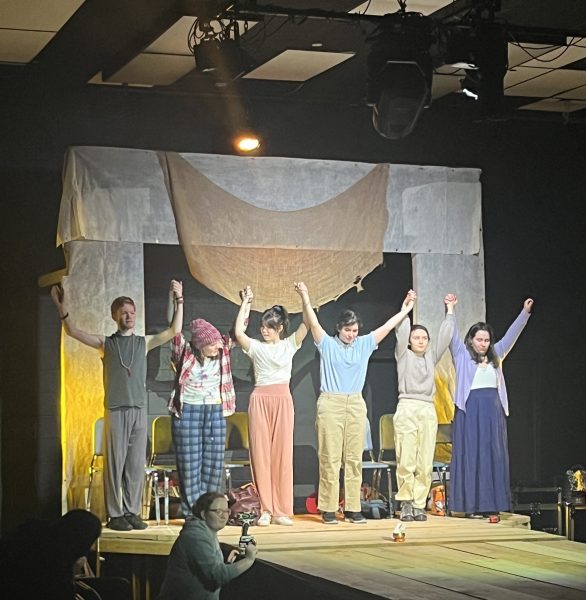
(Styx Hatch)
When Styx Hatch, stage manager for “Small Mouth Sounds,” first described the show to me as “really sad,” with a disembodied voice and sparse dialogue, I was intrigued. Then they mentioned it has lesbians and I was even more intrigued.
Compared to the two previous productions of this year, “Comedy of Errors” (a lesser known Shakespeare play, sure, but it’s still “Shakespeare”) and “Little Shop of Horrors” (a musical theater classic), “Small Mouth Sounds” was unknown to me. I can now say that “Small Mouth Sounds” is one of the most unique things I’ve seen, and unlike anything else, the theater department has done.
Written by Bess Wohl, the story focuses on six misfits as they embark on a retreat in the woods. There, they are led by the Teacher (played by Derek Williams), who we only ever hear as a voice.
The plot itself is direct. We watch as these characters deal with emotional turmoil, grief, and acceptance. How these emotions impact not only themselves but also their relationships with others is explored. However, there is one large thing that separates “Small Mouth Sounds” from the average play. There is little dialogue.
Most plays rely on the spoken word. “Small Mouth Sounds” depends on the audience being attentive to the characters’ actions. The actors use their facial expressions and body language to convey what the character is thinking.
The only time we hear words is during emotional turning points, like when Joan (played by Summer Neiditz) explodes at her girlfriend Judy (played by Margaret Devlin) over frustrations that have been building since Judy had been diagnosed with cancer. Another time we heard words is during Ned’s (played by Katherine Devlin) epic monologue of where his life went wrong. And we hear words when Alicia (played by Rory Allen) yells at her phone due to a lack of service.
Now, at first, it could seem that not employing dialogue is some pretentious choice to create something avant-garde. And it very easily could’ve ended up that way; however, in “Small Mouth Sounds” it works to show the universal human experience of hurt.
Though these people do not know each other, they can see themselves in each other. They see this through their raw actions, which unlike words, can not be filtered. As the teacher declares at the end, they are not alone.
The silence also helped the show, in some ways, feel like a very interesting test. Silence, in my opinion, is one of the most uncomfortable states of being. Adding all the discomfort that the characters go through with the lack of dialogue really enhances the experience. The silence in itself, becomes a character. It works as a way to say to the audience, “There is discomfort in life, but that leads to the good.”
That message could not have been delivered without the hard work of the cast and crew. The show is dependent on unsettling, yet heartfelt and realistic performances. Luckily, all the actors, both those listed earlier as well as Veronica Vaccaro (who played a grieving father) and Ben Spaeth (who played an offbeat yoga instructor) deliver all the emotion.
Each actor reflected the disturbance in their characters in a unique way, without the help of a spoken tone. However, where dialogue is concerned, the monologue and fight mentioned earlier are grand, to say the least, and astonishing, to put it simply.
Any type of production is impossible without a crew. While it would be difficult to name every single crew member individually for their hard work, it was evident throughout the production – particularly the work of sound and lighting. From my memory, there’s never been a Black Box show with this type of production, especially in terms of the disembodied voice. However, even the background noises, with all the loud little bugs buzzing around, added to the production by giving a real sense of what the forest felt like to the characters.
And how could I almost forget the tub of water at the end of the stage? Decorated with fake vines, I at first thought it was just another set piece that was accompanied by splashing sounds to create a realistic feel. Then, I saw the actual little waves and big splashes of water the actors were making, and I was pleasantly surprised.
When a show is not dependent on what is being said, but instead what is being shown, it is crucial that every aspect is well put together and in sync. Thankfully, that’s just what happened here.
All in all, the production of “Small Mouth Sounds” was impressive. Every ounce of hard work put into the show was present and created a unique experience. As the curtain closes on this school year, it does the same on this theatre season; however, they will open again, and, when they do, make sure to keep an eye out for what other shows will be put on. Maybe you’ll find a feeling you’ve never felt before. That can always be found in the theater. Even in its silence.
